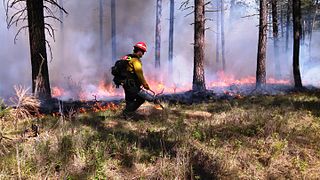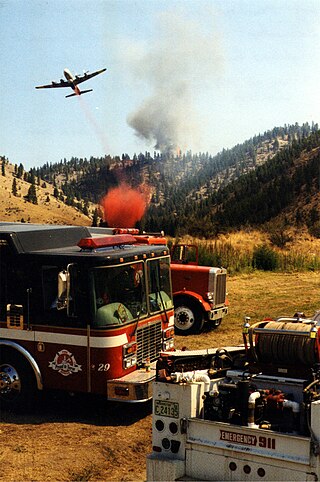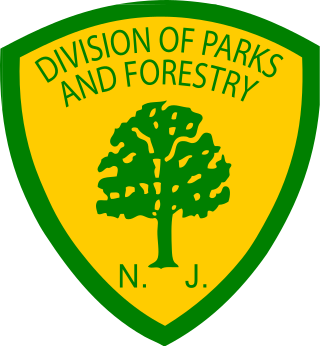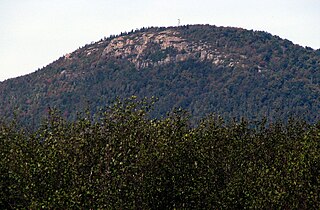
A controlled or prescribed (Rx) burn, which can include hazard reduction burning, backfire, swailing or a burn-off, is a fire set intentionally for purposes of forest management, fire suppression, farming, prairie restoration or greenhouse gas abatement. A controlled burn may also refer to the intentional burning of slash and fuels through burn piles. Fire is a natural part of both forest and grassland ecology and controlled fire can be a tool for foresters.

The Cape May Lighthouse is a lighthouse located in the U.S. state of New Jersey at the tip of Cape May, in Lower Township's Cape May Point State Park. It was built in 1859 under the supervision of U.S. Army engineer William F. Raynolds, was automated in 1946, and continues operation to this day.

Black Elk Peak is the highest natural point in the U.S. state of South Dakota and the Midwestern United States. It lies in the Black Elk Wilderness area, in southern Pennington County, in the Black Hills National Forest. The peak lies 3.7 mi (6.0 km) west-southwest of Mount Rushmore. At 7,244 feet (2,208 m), it is the highest summit in the United States east of the Rocky Mountains. Though part of the North American Cordillera, it is generally considered to be geologically separate from the Rocky Mountains.

A fire lookout is a person assigned the duty to look for fire from atop a building known as a fire lookout tower. These towers are used in remote areas, normally on mountain tops with high elevation and a good view of the surrounding terrain, to spot smoke caused by a wildfire.

A fire lookout tower, fire tower, or lookout tower is a tower that provides housing and protection for a person known as a "fire lookout", whose duty it is to search for wildfires in the wilderness. It is a small building, usually on the summit of a mountain or other high vantage point to maximize viewing distance and range, known as view shed. From this vantage point the fire lookout can see smoke that may develop, determine the location by using a device known as an Osborne Fire Finder, and call for wildfire suppression crews. Lookouts also report weather changes and plot the location of lightning strikes during storms. The location of the strike is monitored for a period of days afterwards, in case of ignition.

Wildfire suppression is a range of firefighting tactics used to suppress wildfires. Firefighting efforts depend on many factors such as the available fuel, the local atmospheric conditions, the features of the terrain, and the size of the wildfire. Because of this wildfire suppression in wild land areas usually requires different techniques, equipment, and training from the more familiar structure fire fighting found in populated areas. Working in conjunction with specially designed aerial firefighting aircraft, fire engines, tools, firefighting foams, fire retardants, and using various firefighting techniques, wildfire-trained crews work to suppress flames, construct fire lines, and extinguish flames and areas of heat in order to protect resources and natural wilderness. Wildfire suppression also addresses the issues of the wildland–urban interface, where populated areas border with wild land areas.

In the state of New Jersey, the New Jersey Division of Parks and Forestry is an administrative division of the New Jersey Department of Environmental Protection. In its most visible role, the Division is directly responsible for the management and operation of New Jersey's public park system which includes 42 state parks, 11 state forests, 3 recreation areas, and more than 50 historic sites and districts. However, its duties also include protecting state and private lands from wildfire, managing forests, educating the public about environmental stewardship and natural resources, as well as growing trees to maintain and restore forests in rural and urban areas, and to preserve the diversity of the trees within the forests.

The Watchman Lookout Station No. 168 is one of two fire lookout towers in Crater Lake National Park in southern Oregon. For many years, National Park Service personnel used the lookout to watch for wildfires during the summer months. It is also a common hiking destination because of its views of Crater Lake and the surrounding area. The building is unusual because it serves the dual purpose of fire lookout and museum. The Watchman Lookout Station is listed on the National Register of Historic Places.

Azure Mountain is a 2,323-foot-tall (708 m) mountain near Blue Mountain Road in the Adirondack Park town of Waverly in Franklin County, New York. Azure Mountain is the site of the Azure Mountain Fire Observation Station, a 35-foot-tall (11 m) steel tower that was built in 1918 and later restored in 2002. The fire tower was listed on the National Register of Historic Places in 2001.

The Azure Mountain Fire Observation Station is a historic fire observation station located on Azure Mountain at Waverly in Franklin County, New York. The station and contributing resources include a 40-foot-tall (12 m), steel-frame lookout tower erected in 1918, a jeep trail now used as a hiking trail, which extends from the base of the mountain to two former observers' cabins, and a foot trail from the cabins to the summit. The tower is a prefabricated structure built by the Aermotor Corporation to provide a front line of defense in preserving the Adirondack Forest Preserve from the hazards of forest fires.
Wildfire suppression in the United States has had a long and varied history. For most of the 20th century, any form of wildland fire, whether it was naturally caused or otherwise, was quickly suppressed for fear of uncontrollable and destructive conflagrations such as the Peshtigo Fire in 1871 and the Great Fire of 1910. In the 1960s, policies governing wildfire suppression changed due to ecological studies that recognized fire as a natural process necessary for new growth. Today, policies advocating complete fire suppression have been exchanged for those who encourage wildland fire use, or the allowing of fire to act as a tool, such as the case with controlled burns.

The Arab Mountain Fire Observation Station is a historic fire observation station located on Mount Arab at Piercefield in St. Lawrence County, New York. The station includes a 40-foot-tall (12 m), steel frame lookout tower erected in 1918, an observers cabin built about 1948, a trace of the foundation of the original cabin, a structure probably used as a root cellar in the 1940s, and the foot trail. The tower is a prefabricated structure built by the Aermotor Corporation and provided a front line of defense in preserving the Adirondack Forest Preserve from the hazards of forest fires.

The Aermotor Windmill Company, or Aermotor Company, is an American manufacturer of wind-powered water pumps. The widespread use of their distinctive wind pumps on ranches throughout the arid plains and deserts of the United States has made their design a quintessential image of the American West.

The Pillsbury Mountain Forest Fire Observation Station is a historic fire observation station located on Pillsbury Mountain summit at Arietta in Hamilton County, New York. The tower was built in 1924 by the Aermotor Windmill Company and the associated observer's cabin and shed in 1950. The lookout tower measures 69 feet tall.

Margarita Lookout, also known as Santa Margarita Lookout, is a lookout point in the Santa Margarita Mountains, part of the larger Santa Ana Mountains in San Diego County, California. The original fire lookout tower, built in 1935 by the CCC, was later replaced by a new lookout tower and cabin in 1965. In 1986, the tower and cabin were both burned in a wildfire. In 1988, the burnt tower was destroyed in a collision with a Marine Corps CH-46E helicopter. The lookout tower was badly damaged as a result and was promptly removed. Only a concrete foundation remains today, however the site is still accessible via trail. The lookout is approximately one mile north of Margarita Peak, and is located in the Cleveland National Forest.

Bearfort Mountain, historically known as Bear Ford Mountain, is a mountain ridge located near Wawayanda State Park in West Milford, Passaic County, New Jersey. It is a continuation of Bellvale Mountain in New York. The Appalachian Trail crosses along the ridge into New York. Puddingstone of the Skunnemunk Conglomerate is visible along the ridge.

The New Jersey Forest Fire Service (NJFFS) is an agency within the New Jersey Department of Environmental Protection. Founded in 1906 with a focus on wildland fire suppression and fire protection, the Forest Fire Service is the largest firefighting department within the state of New Jersey in the United States with 85 full-time professional firefighting personnel, and approximately 2,000 trained part-time on-call wildland firefighters throughout the state. Its mission is to protect "life and property, as well as the state's natural resources, from wildfire".

Penn State Forest is a 3,366-acre (5.259 sq mi) state park in Burlington County, New Jersey, United States. The forest is protected as a section of the environmentally sensitive Pine Barrens. Various recreational resources are available to visitors including Oswego Lake and the Oswego River for boating and fishing. The lake has a picnic area with a boat launch and primitive restrooms. Miles of unpaved roads composed of gravel, dirt, and sand traverse all areas of the forest. The roads are open for hiking, mountain biking, horseback riding, and cross-country skiing, as well as four-wheel driving. Hunting for deer, wild turkey, water fowl, and small game is permitted in season. A section of the Pine Barren Plains, a globally rare dwarf forest ecosystem that reaches a mature canopy height of about 4 ft (1.2 m), is located in the northeastern portion of the park. Penn State Forest is operated and maintained by the New Jersey Division of Parks and Forestry.
























